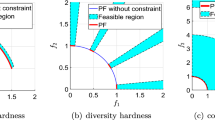Abstract
It is well known that it is very difficult to solve constrained multiobjective optimization problems. Such problems not only need to optimize the objective function but also need to consider the constraints. The epsilon constraint handling method is commonly used, which releases the degree of constraint violations by defining a gradually decayed epsilon. However, for the solutions whose overall constraint violations degree is greater than epsilon, the original epsilon constraint handling method cannot guarantee the diversity of solutions and only constraint violations are considered. To solve this issue, this paper proposed an infeasible solutions diversity maintenance strategy for solutions whose constraint violations degree is greater than epsilon. The experimental results show that our proposed algorithm is very competitive with other state-of-the-art algorithms for constrained multiobjective optimization problems.






Similar content being viewed by others
References
Agrawal V, Lightner C, Lightner-Laws C, Wagner N (2017) A bi-criteria evolutionary algorithm for a constrained multi-depot vehicle routing problem. Soft Comput 21(17):5159–5178
Arzamendia M, Gregor D, Reina DG, Toral SL (2019) An evolutionary approach to constrained path planning of an autonomous surface vehicle for maximizing the covered area of ypacarai lake. Soft Comput 23(5):1723–1734
Cai X, Hu Z, Fan Z (2013) A novel memetic algorithm based on invasive weed optimization and differential evolution for constrained optimization. Soft Comput 17(10):1893–1910
Coello CAC, Lamont GB, Van Veldhuizen DA et al (2007) Evolutionary algorithms for solving multi-objective problems, vol 5. Springer, Berlin
Deb K (2001) Multi-objective optimization using evolutionary algorithms, vol 16. John Wiley & Sons, New York
Deb K, Agrawal RB et al (1995) Simulated binary crossover for continuous search space. Complex Syst 9(2):115–148
Deb K, Pratap A, Agarwal S, Meyarivan T (2002) A fast and elitist multiobjective genetic algorithm: NSGA-II. IEEE Trans Evol Comput 6(2):182–197
Fan Z, Fang Y, Li W, Lu J, Cai X, Wei C (2017) A comparative study of constrained multi-objective evolutionary algorithms on constrained multi-objective optimization problems. In: 2017 IEEE congress on evolutionary computation (CEC), IEEE, pp 209–216
Fan Z, Fang Y, Li W, Cai X, Wei C, Goodman E (2019a) MOEA/D with angle-based constrained dominance principle for constrained multi-objective optimization problems. Appl Soft Comput 74:621–633
Fan Z, Li W, Cai X, Huang H, Fang Y, You Y, Mo J, Wei C, Goodman E (2019b) An improved epsilon constraint-handling method in MOEA/D for CMOPs with large infeasible regions. Soft Comput 23(23):12491–12510
Jain H, Deb K (2013) An evolutionary many-objective optimization algorithm using reference-point based nondominated sorting approach, part II: handling constraints and extending to an adaptive approach. IEEE Trans Evol Comput 18(4):602–622
Li H, Zhang Q (2008) Multiobjective optimization problems with complicated Pareto sets, MOEA/D and NSGA-II. IEEE Trans Evol Comput 13(2):284–302
Ma Z, Wang Y (2019) Evolutionary constrained multiobjective optimization: Test suite construction and performance comparisons. IEEE Trans Evol Comput 23(6):972–986
Ma Z, Wang Y, Song W (2019) A new fitness function with two rankings for evolutionary constrained multiobjective optimization. IEEE Trans Syst Man Cybernet Syst
Miettinen K (2012) Nonlinear multiobjective optimization, vol 12. Springer Science & Business Media, Berlin
Mirjalili S (2016) SCA: a sine cosine algorithm for solving optimization problems. Knowl-Based Syst 96:120–133
Takahama T, Sakai S (2006) Constrained optimization by the \(\epsilon \) constrained differential evolution with gradient-based mutation and feasible elites. In: 2006 IEEE international conference on evolutionary computation, pp 1–8
Tian Y, Cheng R, Zhang X, Jin Y (2017) PlatEMO: a MATLAB platform for evolutionary multi-objective optimization [educational forum]. IEEE Comput Intell Mag 12(4):73–87
Wang BC, Li HX, Li JP, Wang Y (2018) Composite differential evolution for constrained evolutionary optimization. IEEE Trans Syst Man Cybernet Syst 49(7):1482–1495
Wang Y, Cai ZX, Zhou YR, Xiao CX (2009) Constrained optimization evolutionary algorithms. J Softw 20(1):11–29
While L, Hingston P, Barone L, Huband S (2006) A faster algorithm for calculating hypervolume. IEEE Trans Evol Comput 10(1):29–38
Yang Z, Cai X, Fan Z (2014) Epsilon constrained method for constrained multiobjective optimization problems: some preliminary results. In: Proceedings of the companion publication of the 2014 annual conference on genetic and evolutionary computation, pp 1181–1186
Zhang J, Wang J (2020) Improved salp swarm algorithm based on levy flight and sine cosine operator. IEEE Access 8:99740–99771
Zhang Q, Li H (2007) MOEA/D: a multiobjective evolutionary algorithm based on decomposition. IEEE Trans Evol Comput 11(6):712–731
Acknowledgements
The authors wish to thank the support of the National Natural Science Foundation of China (Grant No. 61876164, 61772178), the MOEA Key Laboratory of Intelligent Computing and Information Processing, the Science and Technology Plan Project of Hunan Province (Grant No. 2016TP1020), the Provinces and Cities Joint Foundation Project (Grant No. 2017JJ4001), Science and Technology Planning Project of Guangdong Province of China (Grant No. 2017B010111005), the Hunan province science and technology project funds (Grant No. 2018TP1036).
Author information
Authors and Affiliations
Corresponding author
Ethics declarations
Conflicts of interest
The authors declare that they have no conflicts of interest.
Ethical standard
This article does not contain any studies involving animals performed by any of the authors. This article does not contain any studies involving human participants performed by any of the authors.
Additional information
Publisher's Note
Springer Nature remains neutral with regard to jurisdictional claims in published maps and institutional affiliations.
Rights and permissions
About this article
Cite this article
Zhou, J., Zou, J., Zheng, J. et al. An infeasible solutions diversity maintenance epsilon constraint handling method for evolutionary constrained multiobjective optimization. Soft Comput 25, 8051–8062 (2021). https://doi.org/10.1007/s00500-021-05880-5
Accepted:
Published:
Issue Date:
DOI: https://doi.org/10.1007/s00500-021-05880-5




